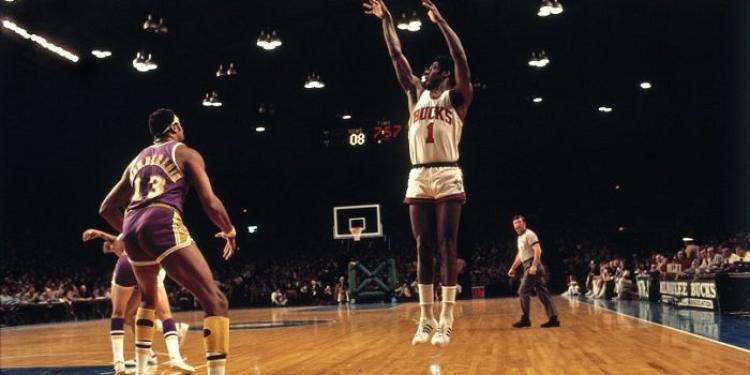The NBA’s Greatest Scorers (part 1)
Posted: June 1, 2015
Updated: October 6, 2017

A look at the “baddest” scoring machines in the history of the NBA.
A scorer is many things to many people. He can be a role model to younger people encouraging them to follow in same footsteps. A scorer can put a city back on the map making it popular and more appealing for investors. A scorer can also be someone who can change the odds in Vegas or online sportsbooks in the US.
• Wilkins drew spectators and dazzled his Atlanta Hawks fans
• Julius Erving was a professional during the change from the ABA to the NBA
• Rick Barry led in scoring in the NCAA, ABA and NBA for an individual season
The scoring machine can change the way we look at the game. He can bring us hope and excitement when they are on top and can reduce us to tears when they are beaten. Let’s look at some of the greatest scorers in the history of the NBA and what makes them so special in the eyes of so many.
The human highlight film and the Doctor who prescribed it

Dominque Wilkins was known as the “human highlight reel” because his every finish is film worthy. At 26,668 career total points, Wilkins was a force to be reckoned with. Most known for his dunking ability and was NBA Slam Dunk champion in 1985 and 1990. Wilkins drew spectators and dazzled his Atlanta Hawks fans. Unfortunately, he wasn’t a very good shooter with just average mid and long range shooting ability.
Despite his one-dimensional play, Wilkins has some pedigree to his career. At the University of Georgia, he was voted SEC division Men’s Basketball player of the year in 1981. Wilkins made it to the NBA All-star team nine times during his career with the Atlanta Hawks. Although he didn’t win a professional title until playing in Europe, Wilkins was inducted in the Naismith Basketball Hall of Fame in 2006.

Julius Erving was a man who was a professional during the change from the ABA to the NBA and helped usher in a new era for basketball and brought popularity to the sport unseen before. Known as “Dr. J”, most noted for his dunks, he personalized the dunk, its terminology and made it more than just a move that Centers used. After Dr. J, more highly versatile and athletic guards were encouraged to dunk as a show of power.
The Doctor was fun to watch as he could effortlessly go around people, get in the paint and rise to the rim. Overall, the Doctor won three championships was the fifth-highest scorer in history with 30,026 points. Winning four Most Valuable Player Awards, Dr. J made US gambling news when became the only player to have won an MVP in both ABA and NBA leagues.
The workhorse Rick Barry and the Big O

Rick Barry was the man in the day. Like Julius Erving, Barry played in both ABA and NBA. He was the only professional player who was a scoring leading in the NCAA, ABA and NBA for an individual season. Rick Barry was a show time player who could make lay ups, mid and long range shots. With an average of 25 points per game, Barry scored a high of 35 points in his best season.
While in the NBA, Barry had a dispute over payments owed to him during his time with the Warriors which resulted in him leaving and going to the ABA. Unfortunately, gambling on himself was against US gambling laws. At 25,279 career points, Barry was an asset to the sport showing everyone it’s possible to get scoring titles while being a more complete package. Barry was inducted into the Naismith Basketball Hall of Fame.
Oscar Robertson was a 12-time All-Star who is the only player in NBA history to average a triple-double (points, rebounds, assists) for a whole season. The 14-year veteran was another all around talent who could get points in a variety of ways. Whether he was dunking, laying it up or shooting it, the Big O could get the ball in the hoop. For a big man, Robertson could move quickly driving to the hoop repeatedly if need be.
On average Robertson scored almost 26 points a season, he could’ve made more points if were more selfish in his play. The Big O managed to have 77 games in which he scored higher than 40. He was able to give the Milwaukee Bucks their only NBA championship in 1971. Robertson was inducted into the Hall of Fame for his individual play and a second time for being a member of the 1960 U.S Olympics Men’s basketball team.












